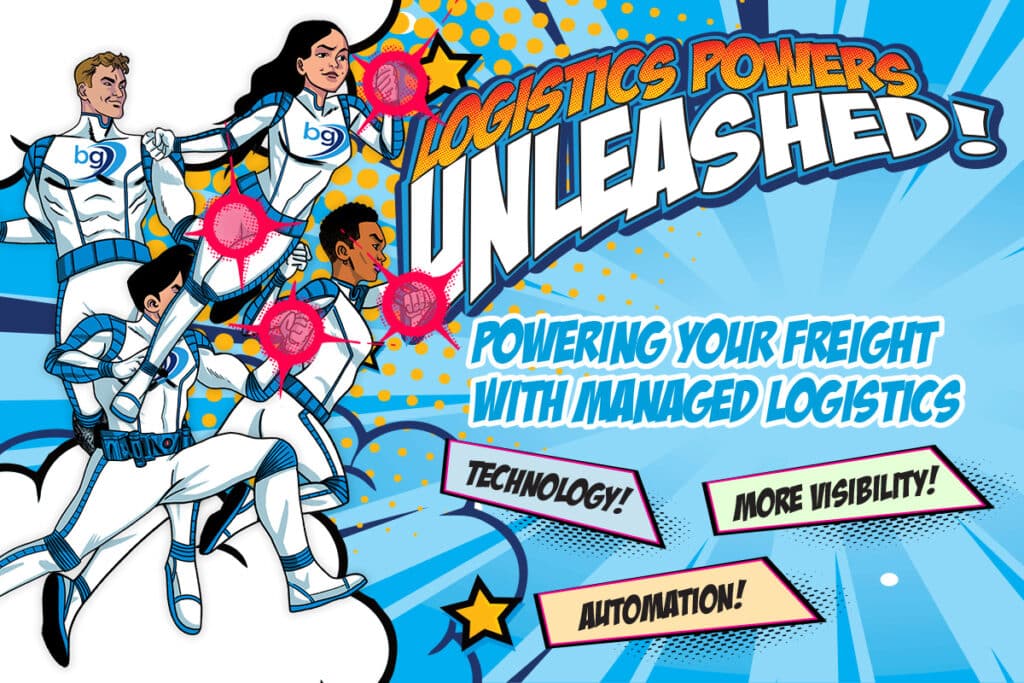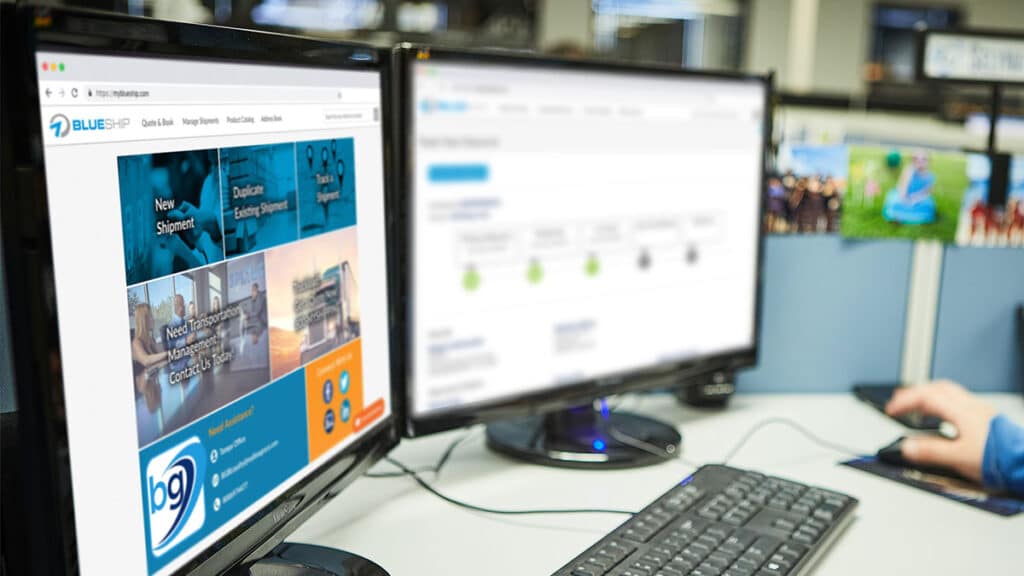

Fresh industry faces and sophisticated new tools are making automation a crucial piece of the freight brokerage field
By Tom Gresham | MHI Solutions Improving Supply Chain Performance
Spurred on by innovative new industry players and the increasingly ambitious investments in technology by the field’s more traditional companies, freight brokerages have taken a major step toward more fully embracing the digital in their processes, leading to rapid changes in the way goods are moved throughout the country. Mark Ford, chief operating officer for MHI member BlueGrace Logistics said those freight brokers who so far have been hesitant to embrace the industry’s digital evolution now face a steep climb to catch up with the competition.
“I think if you haven’t really started the process yet, you’re probably already too late to the party,” Ford said.
In recent years, digital freight brokerages such as Uber Freight, Transfix and Convoy have entered the field and made inroads, bringing with them an on-demand, automated approach to linking carriers with shipping loads through mobile apps, while more traditional brokers themselves have adopted a range of tech tools designed to maximize efficiency and take advantage of the new capabilities that sophisticated technology supplies. Change to the industry has come swiftly.
Jeff Hopper, chief marketing officer for DAT Solutions said freight companies have simple reasons for adopting more digital tools, even if companies vary in how they go about implementing those tools—and the extent to which they integrate them.
“It’s about having the right truck in the right place at the right time with the right load and the right price to move it,” Hopper said. “All at ultra-fast speed and efficiency. That’s what we’re all working toward.”
“The growing number of digital freight brokers entering the industry, along with the increasing rate at which technological integrations are being made into logistical processes, are forcing traditional competitors to take a closer look at the value they are able to offer to customers.” —Drew McElroy, Transfix
Many of the newer players that have entered the freight field with a digital approach have been vocal about their belief that the industry has lagged behind others in adopting digital technology, leading to waste and inefficiency. Drew McElroy, founder and CEO of Transfix, said the freight industry has long run on “antiquated methods, such as email, phone calls and manual logging.”
“Once digital freight technology broke the surface, there was inevitably some initial pushback and reluctance, as is the case with any deviation from the traditional way of doing things,” McElroy said. “Now, however, I think there’s been a change in perception. As an industry we have seen just how beneficial these tools have been to improving current processes and overall operations, so as a shipper or carrier I think it would be difficult not to be optimistic about what these tools may mean for the freight space moving forward. Even more so, I think whether companies are enthusiastic about this change or not, the future is growing increasingly digital, which means that making these integrations will be key to staying ahead of the competition.”
INVESTING IN TECH
Convoy is a nationwide digital freight network that features a phone-based app to connect carriers and shippers, automating the matching process. In February, Convoy announced it was automatically matching—without human intervention—100% of loads to trucks in top markets. Nationwide, Convoy is now automatically matching 97% of loads to trucks. Convoy reached that level of automation by allowing carriers to find and book their desired loads on Convoy’s app. Arpan Sinha, Convoy head of product for matching, said the industry-wide influence of the new freight-on-demand tools is apparent.
“As it relates to Convoy, we are seeing a major impact and we expect this influence to grow, especially in areas tied to efficiency for carriers and shippers, as well as environmental sustainability,” Sinha said.
McElroy said companies such as Transfix that are founded as digital freight brokers are better positioned to operate in the new reality than more traditional brokerages.
“The growing number of digital freight brokers entering the industry, along with the increasing rate at which technological integrations are being made into logistical processes, are forcing traditional competitors to take a closer look at the value they are able to offer to customers,” McElroy said. “Many older players have realized that digitization is the future and have begun hiring engineers and investing in digital assets, but they are not as wellpositioned to fully leverage these types of capabilities as some of the newer companies in our space.”
Ford does not believe more traditional freight brokerages are illequipped to incorporate digital capabilities, but he does think the rise of digital freight companies has provided a stiff push forward for many in the industry.
“What you’re seeing is it puts more pressure on us to invest more rapidly in technology and maybe provides a sense of urgency in delivering on that,” Ford said.
However, Ford said many traditional freight brokerages already have been devoting resources to automation.
“I think the biggest thing that most people don’t realize is that there are plenty of companies out there that have been investing in building technology inhouse or integrating with outside companies to automate manual processes for years, even to the extent of using or utilizing artificial intelligence to organize data and expedite decision-making processes internally,” Ford said.
In fact, Ford argues, “I don’t think there’s really anything the companies that market themselves as digital freight brokers or digital marketplaces can offer that we’re not already doing or are in the process of building out on our end. However, we have the advantage of numerous years’ worth of data and have service offerings that will be very hard for the digital players to replicate.”
THE VALUE OF DATA
The availability of data is a key reason that the adoption of digital tools is leading to efficiency gains throughout the freight industry.
“The short answer to where a technology is going and how it’s driving the freight industry lies in the data and the ability to utilize that data in very intelligent ways,” Hopper said.
For instance, DAT Solutions has created a rate view product that is the culmination of $65 billion in annual freight spending that goes through its platform. Hopper said the product provides rate data to network participants so they know what to expect to pay based on historical rates. DAT Solutions is also implementing a function that will predict what rates will be, sharpening planning for the future. On the load side, Hopper said the process is about “more intelligently understanding the data points of the truck locations and where the load is and moving it at speeds and efficiencies I don’t think anyone would’ve dreamed of a few years ago.”
“What’s driving all of this is the race to same-day delivery, even delivery within hours,” Hopper said. “The fact that freight is able to be moved and delivered within a day requires a lot of technology.”
“I don’t think the shipper or carrier community really wants to see total automation, because they rely on our expertise to translate what’s going on in the marketplace, and for us to intervene on their behalf when a deviation occurs before, during or after a shipment delivers.”
—Mark Ford, BlueGrace Logistics
Ford said BlueGrace has created algorithms based off the data it has accumulated over the years through countless carrier interactions, and uses it to support clients in their decisionmaking. The company introduced a proprietary data mining platform this year that filters through data collected on hundreds of thousands of carrier records to find the best transportation options for every shipment
“Through all of the logic that we’ve built into it, we can take advantage of all of those data points and make it easier for our internal operators to prioritize carrier interactions because the carrier base is so fragmented,” Ford said. “That gives our customers access to capacity that they don’t usually have.”
THE HUMAN ELEMENT
Despite the gains it creates, Ford said automation will always have its limits, leaving room for more traditional human expertise to supplement technology.
“I think more of the process should be automated than not, but I don’t see how you can ever replace the human intervention piece,” Ford said. “I don’t think the shipper or carrier community really wants to see total automation, because they rely on our expertise to translate what’s going on in the marketplace, and for us to intervene on their behalf when a deviation occurs before, during or after a shipment delivers. I think there’s a nice blend to be found in there somewhere.”
Just as more traditional freight brokerages don’t see themselves as too hidebound to implement new digital tools, digital brokerages don’t see themselves as lacking the necessary human capital to provide personalized service. Sinha said Convoy does not view relationship building as an obstacle to its success, noting that the company has established relationships with a diverse group of customers in its short history.
“Since launching in 2015, Convoy has been very well-received by a wide range of customers ranging from numerous Fortune 500 customers to other organizations nationwide,” Sinha said.
Ford said the freight brokerage industry’s push to the digital leads to intense competition for the data scientists and others who can make it happen.
“There can be a constraint on available technical talent with all the new entrants and the shift towards technology,” Ford said.
McElroy believes the digital brokerages have an inherent advantage over more traditional brokerages in hiring the workers most in demand.
“These are big, traditional companies, and they’ve spoken a lot, especially recently, about investing in technology and hiring engineers and that sort of thing. But the reality is that if you’re a talented engineer, you have no interest in going to work for one of these companies,” McElroy said. “When you’re battling it out on building a highly sophisticated set of technology, recruiting programmers is your lifeblood. If you can’t consistently get the best people to work with you, you’re going to struggle.”
“The short answer to where a technology is going and how it’s driving the freight industry lies in the data and the ability to utilize that data in very intelligent ways.” —Jeff Hopper, DAT Solutions
LOOKING AHEAD
Ford said he sees room for a variety of models in the industry. He doesn’t believe the industry faces an “either or” situation of digital brokerages versus traditional ones and compares the capacity for a diversity of freight brokerages to the myriad varieties of hotels.
“Our industry is so massive … and I think it’s large enough that you can have lots of different companies from across the spectrum,” Ford said.
Still, Ford said the necessity of a sophisticated approach to integrating technology into freight brokerage puts particular pressure on brokers without the resources of the larger companies in the field.
“I think there’s going to be a lot of pressure on some of the small- to mid-sized brokers out there,” Ford said. “They’re going to have to make decisions about where they fit in. The more automation takes care of the higher volume lanes causes the more sophisticated freight brokers to swim in the lanes that today fall off to the smaller players. I think that does put a lot of pressure on some of the small- to mid-sized companies to decide whether or not they’re going to start making significant investments in technology to keep pace, consider M&A, or look at whether they want to stop competing altogether and just exit the marketplace.”
Hopper said the rapid nature of technological advances makes it challenging to anticipate the shape that change will take in the industry in the future.
“What I can say is that those who intelligently adopt technology and invest in figuring out how to best utilize it are the ones who are going to come out winners,” Hopper said.



